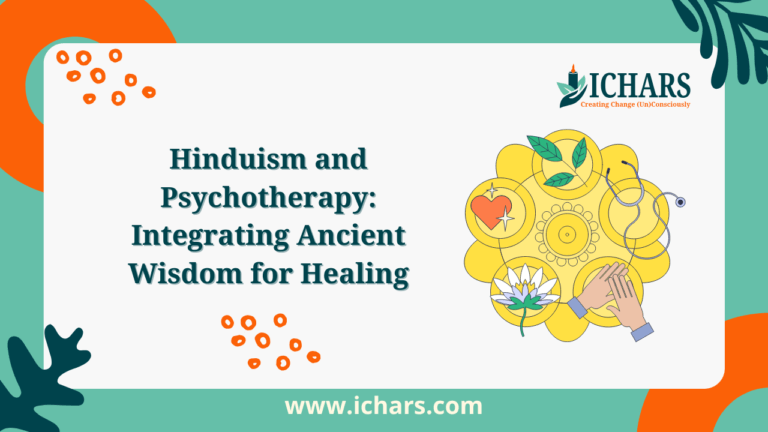Introduction: Bridging Ancient Wisdom and Modern Therapy
Hinduism, often referred to as Sanatana Dharma, is among the world’s oldest spiritual traditions, with a wealth of knowledge that transcends mere religion.
It encompasses a philosophical system designed to understand the human mind, spirit, and the nature of existence. Central to Hindu philosophy are teachings that address self-awareness, emotional resilience, and the interconnectedness of life.
These insights align seamlessly with the principles of Cognitive Hypnotic Psychotherapy (CHP), a modern integrative therapeutic framework.
This article delves deep into the interplay between Hinduism and CHP, illustrating how timeless spiritual principles can enhance therapeutic interventions.
By blending ancient wisdom with evidence-based psychological techniques, therapists can create a truly holistic approach, empowering clients to navigate their challenges and discover enduring inner peace.
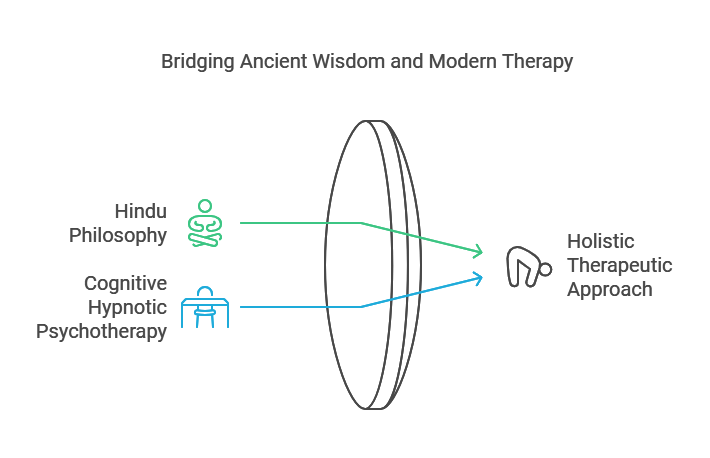
Hindu Philosophy: A Timeless Framework for Emotional Wellbeing
Core Teachings of Hinduism
- Self-Realization (Atman and Brahman): The understanding that the individual self (Atman) is part of the universal consciousness (Brahman) emphasizes the importance of aligning with one’s higher self.
- Dharma and Karma: The principles of righteous living (dharma) and the law of cause and effect (karma) guide individuals to live ethically and responsibly.
- Yoga and Meditation: These practices emphasize the union of body, mind, and spirit, fostering mental clarity and emotional balance.
- Non-Attachment (Vairagya): Letting go of material desires and ego-driven attachments enables individuals to achieve equanimity and inner peace.
- Forgiveness (Kshama): A transformative act that allows individuals to release emotional pain and cultivate compassion.
Cognitive Hypnotic Psychotherapy: A Holistic Therapeutic Model
CHP integrates elements of cognitive-behavioral therapy, hypnotherapy, mindfulness, and neuro-linguistic programming (NLP).
Its goal is to address cognitive patterns, emotional dynamics, and subconscious influences, facilitating sustainable transformation. By incorporating Hindu principles, CHP extends its reach, enabling therapists to guide clients toward profound self-awareness and emotional liberation.
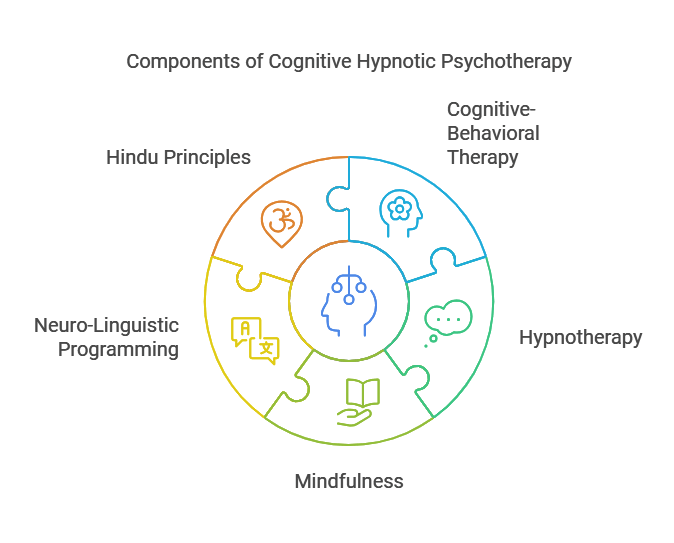
Deep Dive: Integrating Hindu Principles into CHP
1. Self-Realization: Guiding Clients to Their Higher Self
- Hindu Insight: Atman and Brahman teach that true healing comes from recognizing one’s divine essence and interconnectedness with the universe.
- CHP Application: Therapists use guided imagery and hypnotic regression to help clients access their inner wisdom and align with their authentic selves.
- Example Technique: A client is guided into a relaxed state and asked to visualize themselves as a luminous, eternal being, transcending their fears and limitations. This practice fosters clarity and self-compassion.
2. Karma and Dharma: Aligning Actions with Purpose
- Hindu Insight: Understanding karma empowers individuals to reflect on past actions, while dharma encourages alignment with one’s moral and spiritual purpose.
- CHP Application: Timeline therapy helps clients explore the impact of past actions and make conscious, purpose-driven choices moving forward.
- Example Technique: The therapist collaborates with the client to reframe past events in the context of karmic lessons, fostering acceptance and proactive change.
3. Yoga and Meditation: Cultivating Mind-Body Harmony
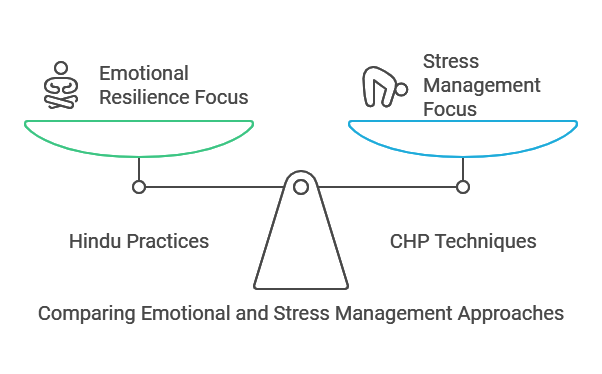
- Hindu Insight: Practices like asana, pranayama, and dhyana promote emotional resilience and mental clarity.
- CHP Application: Therapists integrate mindfulness and breathwork to help clients manage stress and develop emotional balance.
- Example Technique: Mindfulness meditation sessions anchor clients in the present moment, reducing anxiety and fostering a sense of calm.
4. Non-Attachment: Freedom from Emotional Triggers
- Hindu Insight: Vairagya encourages letting go of attachments that perpetuate suffering.
- CHP Application: Anchoring techniques help clients detach from emotional triggers and embrace present-centered living.
- Example Technique: A client learns to associate a state of calm with a specific gesture, enabling them to respond to stress with equanimity.
5. Forgiveness: Healing Through Compassion
- Hindu Insight: Kshama emphasizes releasing grudges to achieve emotional freedom.
- CHP Application: Therapists guide clients through processes like Emotional Empowerment Technique (EET) to forgive themselves and others.
- Example Technique: Clients visualize cutting energetic ties to past grievances, replacing resentment with understanding and compassion.
Advanced Techniques in CHP Inspired by Hindu Philosophy
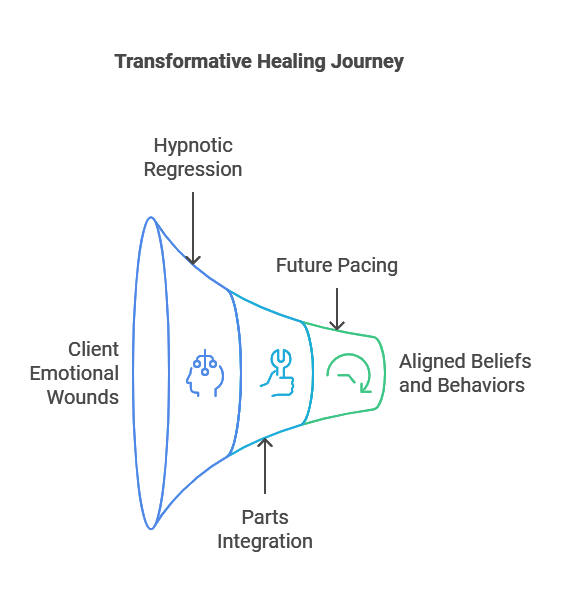
- Hypnotic Regression: Exploring past emotional wounds through the lens of karma provides clients with insights into unresolved patterns.
- Parts Integration: Harmonizing conflicting aspects of the self aligns with the Hindu view of transcending duality to achieve inner unity.
- Future Pacing: Guided visualizations of a dharma-aligned life help clients internalize new beliefs and behaviors.
Case Study: Transformative Healing with Hindu Principles
Client Profile: Kavita, a 45-year-old professional, sought therapy for chronic stress and feelings of purposelessness.
Therapeutic Approach:
- Using hypnotic regression, Kavita explored past choices and karmic patterns influencing her present challenges.
- Mindfulness meditation practices helped her connect to the present moment, reducing stress.
- Dharma exploration guided her to realign her career with her spiritual values.
Outcomes:
- Kavita experienced reduced stress and greater emotional clarity.
- She reconnected with her spiritual beliefs, enabling her to make decisions aligned with her purpose.
- Forgiveness exercises helped her release resentment, fostering deeper relationships.
Limitations and Adaptations in Therapy
While integrating Hindu principles enhances CHP’s effectiveness, challenges may arise:
- Cultural Sensitivity: Not all clients resonate with spiritual frameworks. Therapists should adapt approaches to individual preferences.
- Depth of Integration: Therapists must balance spiritual concepts with evidence-based practices to maintain credibility.
Conclusion: A Convergence of Mind and Spirit
The integration of Hindu principles into Cognitive Hypnotic Psychotherapy offers a transformative pathway to emotional healing and personal growth. By bridging ancient wisdom with modern therapy, clients gain tools to navigate life’s challenges with resilience and purpose.
As demonstrated through real-world applications, this holistic approach fosters emotional freedom, spiritual alignment, and a deeper connection to one’s true self.
For therapists, embracing this convergence opens doors to innovative, impactful practice, ensuring clients experience healing that transcends the boundaries of mind and body.
